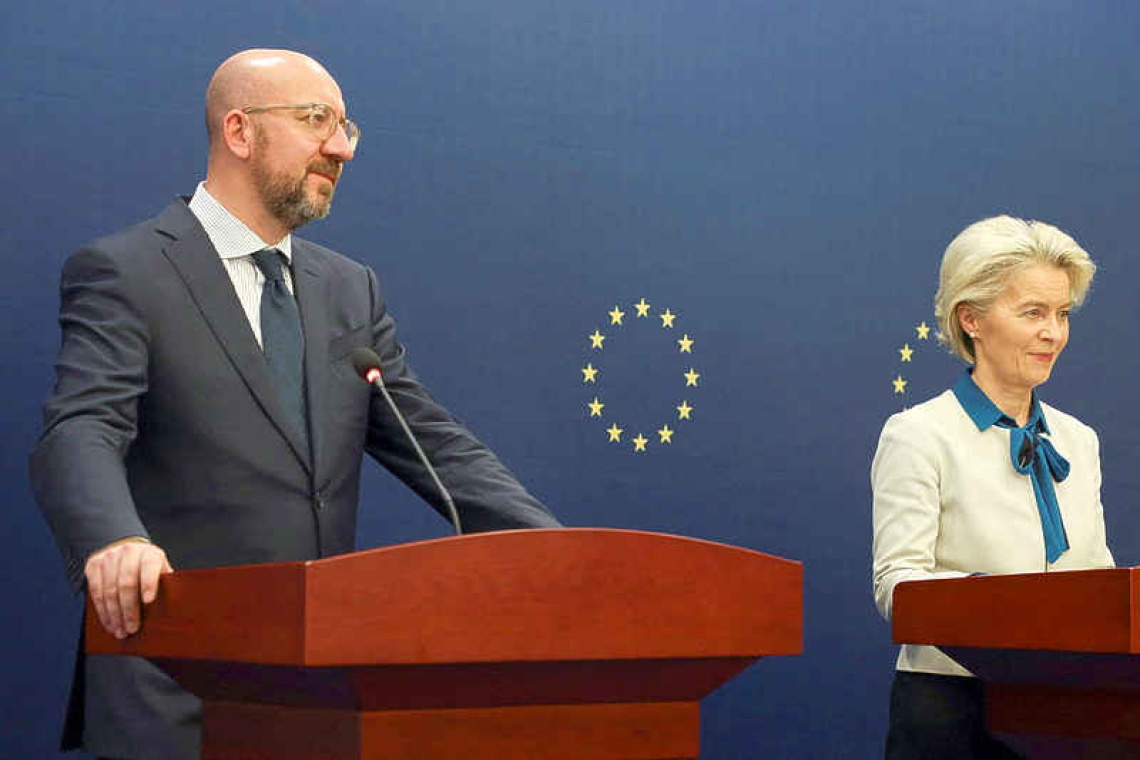BEIJING--China and the European Union agreed their trade relationship should be more balanced at their first in-person summit for four years on Thursday, but gave no sign of resolving differences on a range of issues. Pressing Beijing over the EU's big trade deficit with China, EU leaders said Europe would not tolerate "unfair competition" from China, and Beijing warned the EU that it expected prudence from Brussels when introducing "restrictive" trade policies. There was also no sign that the EU had made any progress in persuading China to use its influence on Russia more to end the Ukraine war - a source of tension in EU-China ties - and to help stop Moscow getting around sanctions over the war. China and the EU have a shared interest in a stable and constructive relationship based on respect for the international rule-based order, European Council President Charles Michel told a press conference after the EU delegation met Chinese President Xi Jinping and Premier Li Qiang. "We need to make our trade and economic relationship more reciprocal and balanced," Michel said, adding that the bloc expects China to take more concrete actions to increase market access for foreign companies. European Council President Ursula von der Leyen said the sides discussed root causes of their trade imbalance, from a lack of access to the Chinese market and preferential treatment to Chinese firms, to overcapacities in Chinese production. "Politically, European leaders will not be able to tolerate that our industrial base is undermined by unfair competition," she said. The EU says its nearly 400-billion-euro ($431.7-billion) trade deficit with China reflects restrictions on EU businesses operating there. A number of EU commissioners have visited Beijing since China lifted pandemic border restrictions this year, including the trade and climate chiefs. Core irritants in the relationship remain but there has been limited progress on technical issues. Von der Leyen said the leaders had discussed medical devices, cosmetics and geographical indicators for food products in terms of redressing trade imbalances. There was "progress" on China's willingness to clarify restrictions on cross-border data flows that have impacted EU firms operating in the world's second-largest economy, she said. But, in a blow to EU-China relations, member state Italy informed China officially "in recent days" that it is leaving the Belt and Road Initiative championed by Xi, Italian government sources told Reuters on Wednesday. Xi said China and Europe should not view each other as rivals or "engage in confrontation" because of their different political systems. China is willing to make the 27-nation EU a key economic and trade partner and to cooperate on science and technology, including artificial intelligence, Xi said. He urged the EU in talks at Beijing's Diaoyutai State Guesthouse to "eliminate all kinds of interference" in the bilateral relationship, state broadcaster CCTV reported. Xi said both sides needed to develop "a right perception" of each other, and encourage mutual understanding and trust. Li said at a separate meeting that China opposed the "broad politicisation and securitisation" of economic and trade issues in violation of the basic norms of market economies, CCTV said. "We hope that the EU will be prudent when introducing restrictive economic and trade policies and when using trade remedy measures to keep its trade and investment markets open," Li said. A big focus of the EU visit was to urge Xi to stop Chinese private companies exporting European-made, dual-use items to Russia for its military campaign in Ukraine. Michel urged China to "engage constructively" on peace proposals by Kyiv, but EU officials gave no indication of movement on the issue of private Chinese re-exports to Russia. China has pushed back against an EU anti-subsidy investigation into Chinese electric vehicles and the EU's "de-risking" policy to reduce its reliance on Chinese imports, particularly of critical raw materials. He Yadong, a Chinese commerce ministry spokesperson, said China believed the investigation "seriously disrupts and distorts the global automotive industry chain... and will have a negative impact on China-EU economic and trade relations. Noah Barkin, senior visiting fellow at the German Marshall Fund, said the summit was largely about "managing differences, and preventing a descent into confrontation." "The EU side achieved its main goal, which was to convey the seriousness of its concerns about imbalances in the trade relationship and China's support for Russia," he said. "But it would be wrong to expect the fundamental economic and political changes from Xi Jinping that the EU is seeking."







